Key takeaways:
- Emphasizing the importance of empathy and patience in navigating interpersonal dynamics can improve communication and relationships.
- Recognizing personal triggers through reflection, journaling, and mindfulness aids in managing emotional responses effectively.
- Developing practical coping strategies, such as deep breathing and establishing routines, enhances resilience amidst stress.
- Regularly evaluating progress allows for adaptability in approaches, transforming challenges into opportunities for growth.
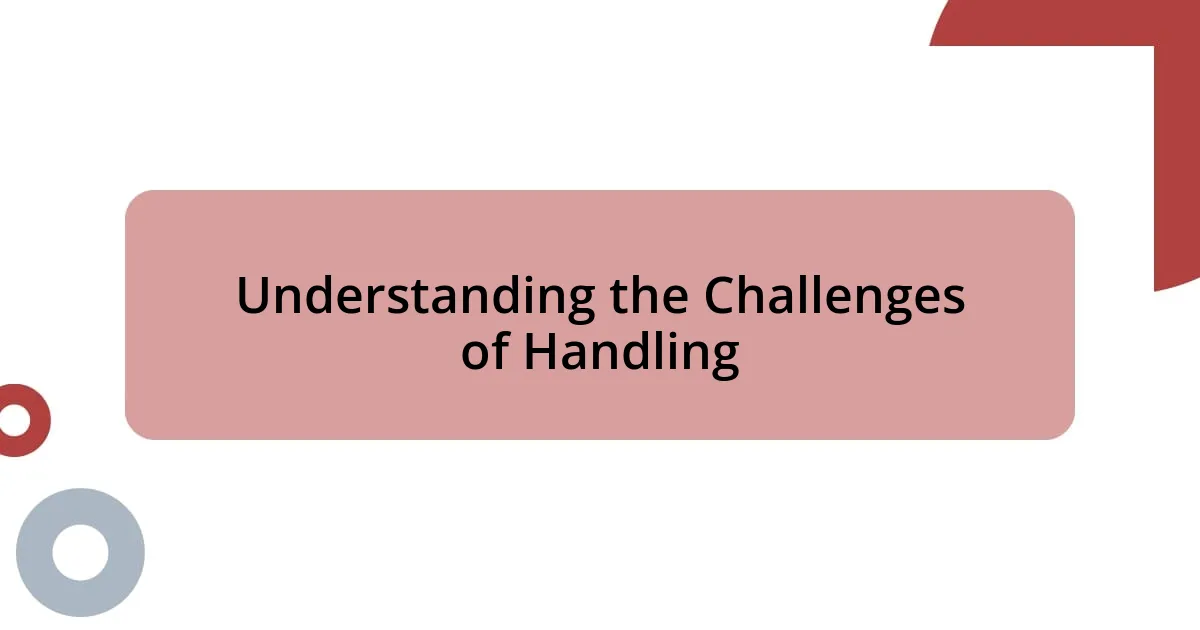
Understanding the Challenges of Handling
Handling challenges can often feel overwhelming, especially when emotions run high. I remember a time when I was juggling multiple responsibilities, and the stress began to affect my decision-making. Isn’t it fascinating how even minor issues can snowball into major roadblocks when we’re not managing our feelings effectively?
One significant challenge I’ve encountered involves navigating interpersonal dynamics. I once faced a situation where a misunderstanding led to fractured relationships within my team. I often wondered, how do we communicate openly without stepping on toes? It was through empathy and patience that I learned the importance of listening, which, surprisingly, eased the tension and opened avenues for dialogue.
Even practical aspects of handling can be daunting. I’ve found myself buried under heaps of tasks, questioning, “Where do I even start?” Prioritization became my lifeline, revealing that sometimes, simply breaking down larger tasks into manageable pieces can transform a seemingly insurmountable mountain into a series of small hills. Have you ever felt the sense of relief that comes from simply taking that first step?
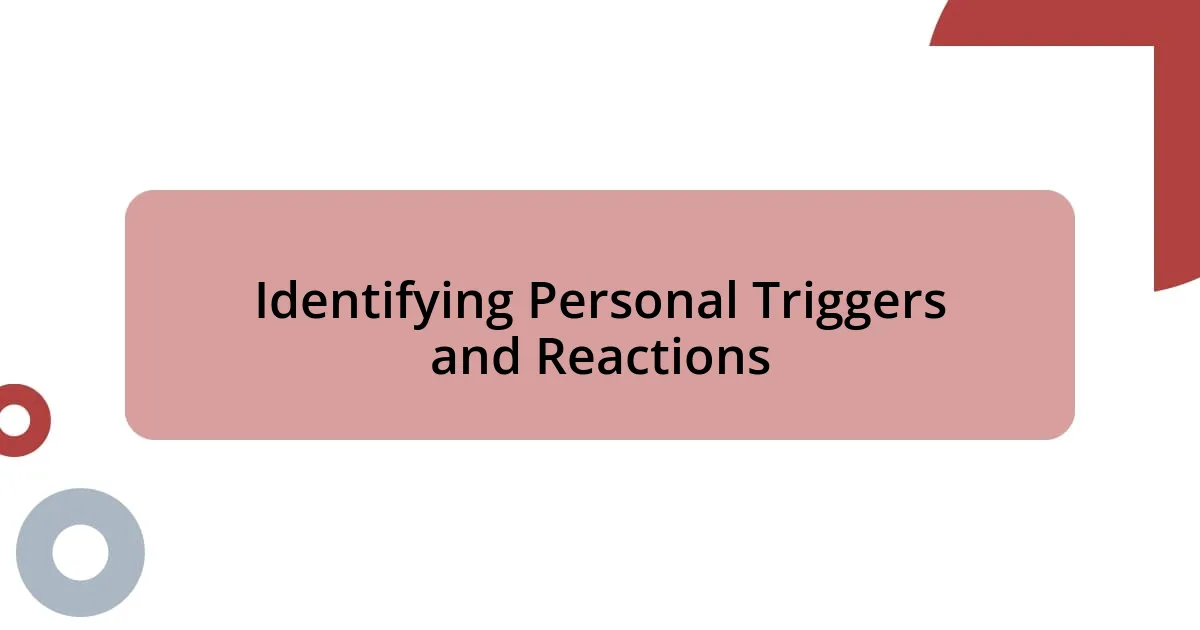
Identifying Personal Triggers and Reactions
Recognizing personal triggers is a crucial step in managing emotional responses. I’ve often noticed that certain phrases or tones can elevate my stress levels in an instant. For example, during a tense meeting, when someone dismisses an idea I’m passionate about, I can feel the heat rising in my cheeks. That rush is my body’s alarm system, signaling me to pause and reassess my feelings. I’ve learned that paying close attention to these signals empowers me to respond rather than react impulsively.
To better identify your unique triggers and reactions, consider these steps:
- Reflect on Past Experiences: Think about moments when you felt overwhelmed. What specifically triggered those feelings?
- Keep a Journal: Document your emotions and the circumstances around them. This can reveal patterns over time.
- Ask for Feedback: Sometimes, others can observe our responses better than we can. Their insights can be enlightening.
- Practice Mindfulness: Engaging in mindfulness exercises helps me stay grounded and aware of my emotional state in real-time.
- Create a Trigger Checklist: List common situations that ignite strong emotions for you. This helps prepare for potential challenges ahead.
By using these strategies, I’ve seen how awareness transforms my approach to handling situations, fostering healthier responses and interactions.
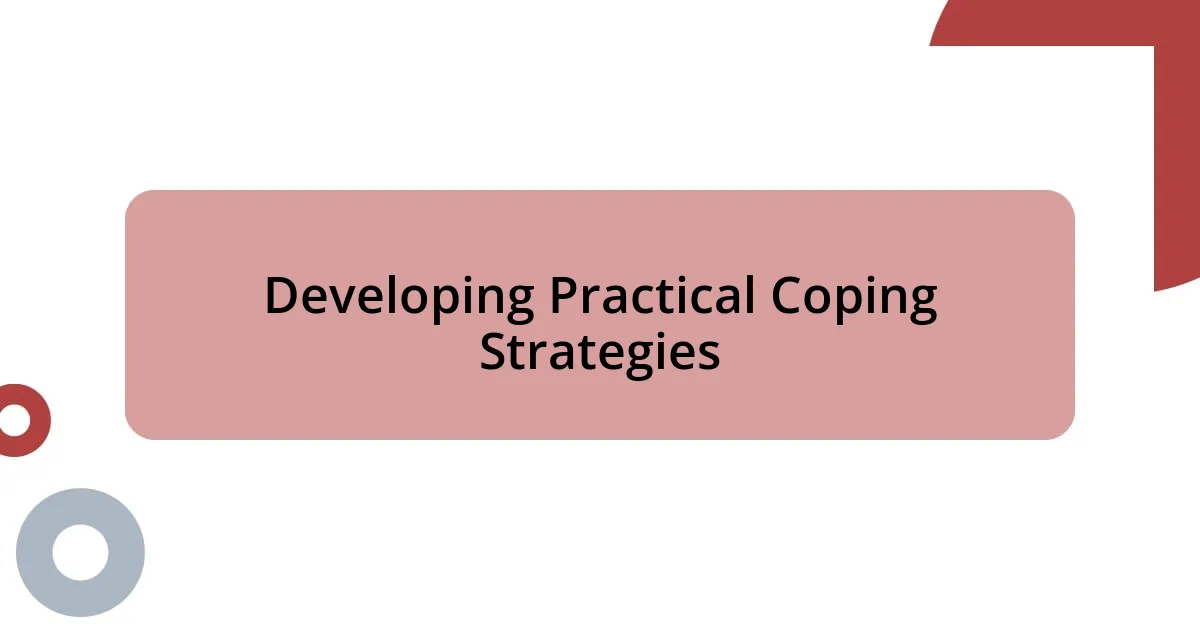
Developing Practical Coping Strategies
Developing practical coping strategies is essential for navigating life’s ups and downs. One technique that has truly resonated with me is practicing deep breathing. I recall a particularly hectic day at work when deadlines loomed large. As panic set in, I took a moment to close my eyes and breathe deeply. This brief pause not only calmed my racing heart but also cleared my mind enough to prioritize my tasks more effectively. Have you ever experienced how a few calming breaths can shift your entire perspective?
Another strategy I’ve found beneficial is establishing a routine. This can create a sense of stability amidst chaos. I try to start my mornings with a specific ritual—whether it’s a cup of tea, a short walk, or some light stretches—this sets a positive tone for the day ahead. The predictability of routine has helped ground me during periods of uncertainty, allowing me to feel more in control. What routines do you find comfort in, if any?
Moreover, seeking support from friends or family can provide incredible relief. I remember reaching out to a close friend during a particularly challenging phase in my life. Just by sharing what I was going through, I felt a weight lift off my shoulders. It was a reminder that we don’t have to face our struggles alone. Making time for personal connections can be a powerful coping strategy that fosters resilience.
| Strategy | Personal Experience |
|---|---|
| Deep Breathing | Helped calm my nerves during a stressful workday, allowing me to regain focus. |
| Establishing a Routine | Starting my mornings with a ritual brings stability and predictability to my day. |
| Seeking Support | Sharing my challenges with a friend provided relief and reminded me of the importance of community. |
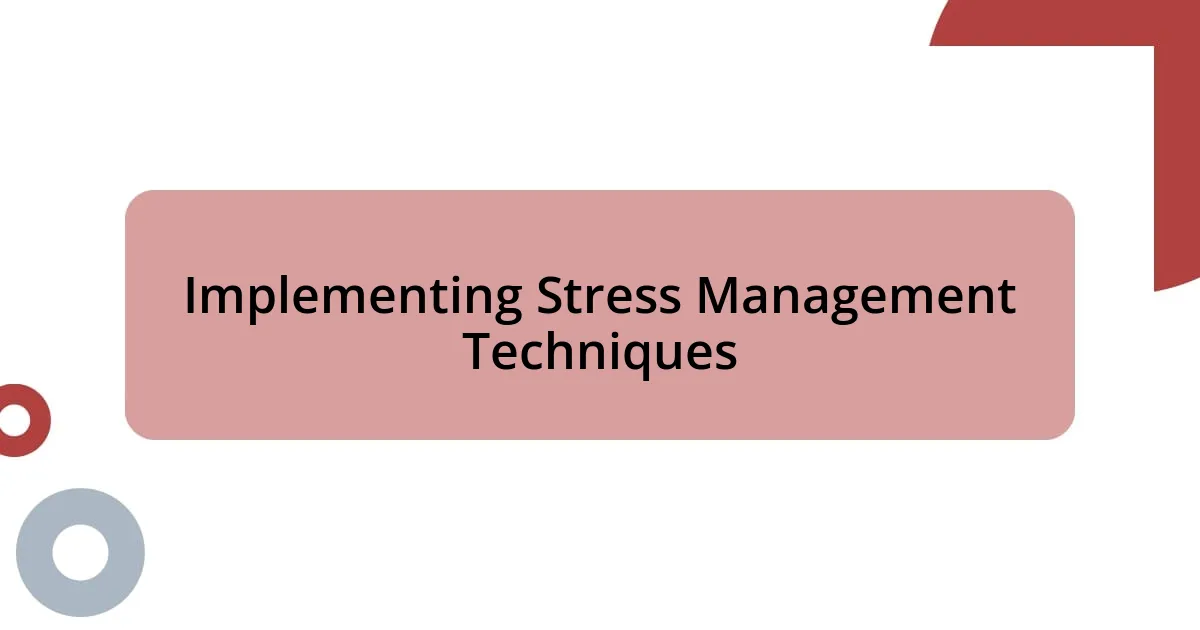
Implementing Stress Management Techniques
Implementing stress management techniques can transform how we navigate challenging moments. One of my favorites has been incorporating meditation into my daily routine. I still vividly remember my first session; the initial silence made me uncomfortable, but soon, I felt a wave of calm wash over me. It was as if I had tapped into a reservoir of peace that had been waiting for me. Have you ever noticed how just a few minutes of stillness can shift your energy for the rest of your day?
Another effective technique I utilize is prioritizing physical activity. I started small, with just ten minutes of stretching in the morning, and gradually, I found myself looking forward to these moments. Exercise becomes a transformative outlet, releasing those stress-fighting endorphins. Whenever I feel overwhelmed, lacing up my sneakers and going for a brisk walk provides both clarity and a sense of accomplishment. How does movement affect your stress levels? I’ve learned it can be a game changer.
Lastly, I frequently remind myself about the importance of disconnecting from technology. One evening, I decided to switch off my devices and simply enjoy a book. Surprisingly, it felt liberating to step away from screens and engage with something tactile. That break allowed me to recharge. Have you tried setting boundaries with technology? It’s a simple yet effective way to cultivate a healthier mental space amidst daily distractions.
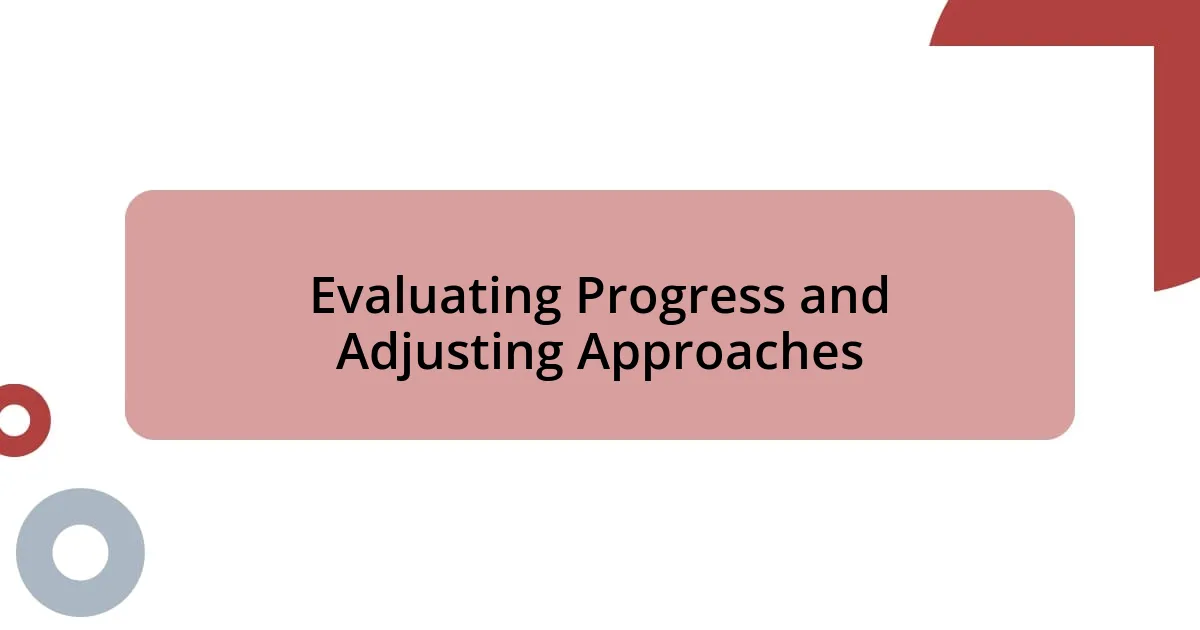
Evaluating Progress and Adjusting Approaches
Evaluating progress is a crucial part of handling life’s challenges. I remember a time when I was struggling with a project at work; I decided to track my progress weekly. This approach gave me clarity, allowing me to see where I was making strides and where I was stumbling. Have you ever felt overwhelmed and realized that breaking things down could shine a light on the path forward?
Sometimes, it was also essential for me to adjust my approaches based on what I discovered. After a few weeks of monitoring my progress, I recognized that my strategy wasn’t yielding the results I wanted. Instead of sticking to it stubbornly, I took a step back and shifted my focus. It was a simple yet empowering realization—changing my tactics didn’t mean I was failing; it meant I was learning. How often do you reassess and adapt your strategies when facing obstacles?
I’ve come to appreciate that evaluating progress isn’t just about the numbers or tasks completed; it’s about personal growth and adaptability. One particular moment stands out when I reflected on how far I had come after making adjustments. Suddenly, challenges transformed into opportunities for learning, and the lightness of that realization fueled my motivation. What does evaluating your progress mean for you? For me, it’s about embracing the journey and the changes that come with it.














